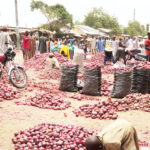The Centre for the Study of the Economies of Africa (CSEA) and United Nations Conference on Trade and Development (UNCTAD) have urged the federal government to strengthen the productive sector to engender economic growth and stability .
Participants at the UNCTAD- CSEA workshop made the call on Thursday in Abuja, saying that the state of Nigeria’s economy calls for serious concerns and urgent actions.
Inflation surge ravaging economies across Africa
Non-oil sector critical to economic growth – Jim Ovia, others
Speaking at the event, tagged ‘Fostering Productive Capacities in Nigeria for Industrialization, Export Diversification and Inclusive Growth’, Executive Director, CSEA, Dr. Chukwuka Onyekwena, said that Nigeria has been negatively affected by persistent structural weaknesses.
He noted that rising inflation, budget deficits, rising debt to Gross Domestic Product (GDP) ratio, worsening social economic indicators, including unemployment and poverty remained of critical concerns and should be addressed.
“These micro-associated challenges reflect fundamental structural vulnerabilities that existed. Exports concentration is very high with oil and natural gas comprising 95.7 per cent of merchandise.
“The share of the manufacturing sector to GDP is at nine per cent. So, Nigeria clearly has weak productive capacity, which increases its vulnerability to external shocks,” Onyekwena said.
He, therefore, called for political will that would urgently address the weak economy, adding that though Nigeria is a leading economy in Africa, its productive capacity performance is not encouraging.
On his part, UNCTAD’s Africa Director, Paul Akinwumi, said that with the population standing at about 211 million in 2021, high unemployment rate, poverty and widening fiscal deficits, most stakeholders were concerned that the weak state of the Nigerian economy also poses danger for other African countries.
He said that data-driven and evidence-based policy formulation and implementation remained key for Nigeria’s transformational growth and for inclusive growth and development.
“Nigeria is an extractive sector-driven economy, where oil and natural gas account for more than 80 per cent of the country’s exports. This structural economic rigidity poses inherent labour market challenges and offers little flexibility to absorb job seekers in the national economy.
“This is because extractive sectors by their nature are capital intensive and generate a relatively small proportion of employment. The Nigerian economy, which is dependent on natural capital and the export of raw or unprocessed commodities, is subject to the vagaries of external shocks- be they economic, political or health related.
“Due to the impact of the COVID-19 pandemic, Nigeria’s economy is expected to face the most severe recession in decades: GDP dropped by nearly four percent in 2020 and the recovery for 2021 and 2022 remains sluggish.
“This slow pace of economic expansion is particularly troubling when compared to the country’s rapid population growth rate,” Akinwumi said.
Also, an Economist, at the Nigerian Economic Summit Group (NESG), Dr Oluwaseyi Vincent, who spoke on ‘Productive Capacities of Nigeria in a Comparative Perspective’, said that Nigeria clearly has significant room for improving its productive capacities.
He said that there was the need to implement government policy on pharmaceutical production to support a more robust manufacturing sector.
“It is also important to harness comparative advantage opportunities. With many African countries exporting raw materials, Nigeria has numerous opportunities to fill existing gaps. The nation can position itself to benefit from the AfCFTA by enhancing productive capacities,” he said.
He also said that achieving spending commitments on health must continue to be a priority while further ICT development remained sacrosanct to human capital and better institutions.
Prof. Jonathan Aremu of the International Economic Relations, Covenant University and Consultant, ECOWAS Common Investment Market, said that while the expectations of what the AfCFTA could or should do are very high, domesticating and implementing the agreement as expected remain key.
He said that positioning Nigerian Business for AfCFTA would involve an array of public and private actors involved in AfCFTA implementation.
Aremu said, “The flow of benefits from AfCFTA relies on private firms successfully navigating between national, regional and continental policy frameworks to take advantage of the AfCFTA enlarged markets.”

 Join Daily Trust WhatsApp Community For Quick Access To News and Happenings Around You.
Join Daily Trust WhatsApp Community For Quick Access To News and Happenings Around You.

